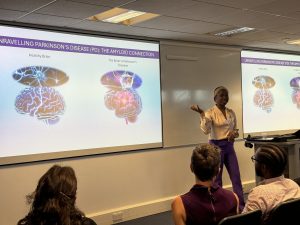We have a 3MT winner: Chinenye Okonkwo!
Following a successful Doctoral School PGR Showcase day on Thursday 6th June, which included the Sheffield Hallam University (SHU) final for the Three Minutes Thesis (3MT) competition, we would like to share with you all that Chinenye Okonkwo was the overall winner of this competition- taking away both the judges and the peoples vitae award!

For winning the judges vote, Chinenye is awarded £250 towards an academic conference. Her entry will also be considered as part of the national Vitae 3MT competition.
This is a great achievement following in the footsteps of previous SHU/I2Ri finalists!
Chinenye says:
“My research investigates the interaction of the brain cells with these amyloids from the point of their introduction into the cell till degeneration occurs to understand how they are implicated in Parkinson’s disease and proffer curative treatment options.”
DETAILS OF CHINENYE’S RESEARCH
Thesis Title: The proteomic response of alpha-synuclein amyloids in Parkinson’s disease
Research Centre: Biomolecular Sciences Research Centre (BMRC)
Supervisory Team: Prof. David Smith, Dr Susan Campbell, Dr Caroline Dalton
Research Summary:
Synucleopathies are a group of diseases characterized by the aggregation of alpha-synuclein. Parkinson’s disease, a predominant type of synucleinopathy, affects 137,000 people in the UK and 10 million worldwide, making it the second most common neurodegenerative disorder.
It is marked by alpha-synuclein aggregation in the substantia nigra, leading to symptoms such as slow movement, tremors, muscle stiffness, and dementia due to the loss of dopaminergic neurons. Alpha-synuclein aggregation is a hallmark of Parkinson’s disease. In its native state, alpha-synuclein is an intrinsically disordered protein involved in synaptic transmission.
However, its aggregated forms, including oligomers and protofibrils, are known to contribute to neurotoxicity in Parkinson’s disease through mechanisms such as membrane disruption, oxidative stress, poor protein clearance, and ferroptosis.
The diverse mechanisms associated with alpha-synuclein-modulated toxicity prompted us to investigate its proteomic interactions within neuronal cells using various techniques, including Nano-Liquid Chromatography-Tandem Mass Spectrometry, 3D Cell Culture, Confocal Microscopy, Recombinant Protein Expression, and Protein Chemistry.
Our goal is to understand the underlying processes and potentially identify therapeutic targets. My research interest is in the development of therapeutic drugs.
